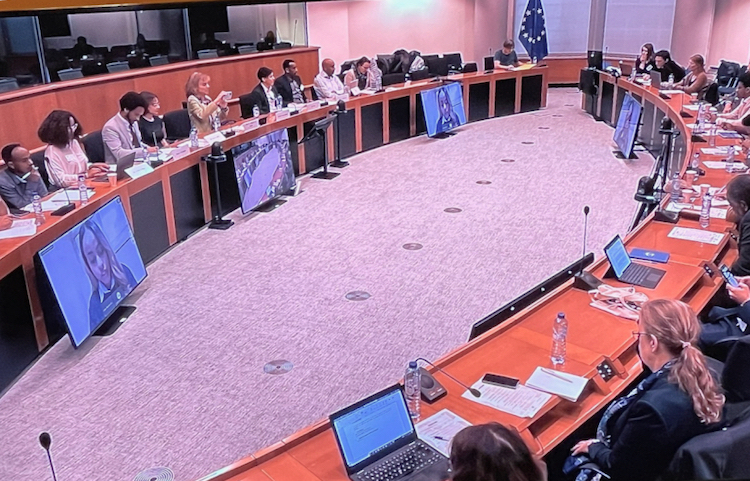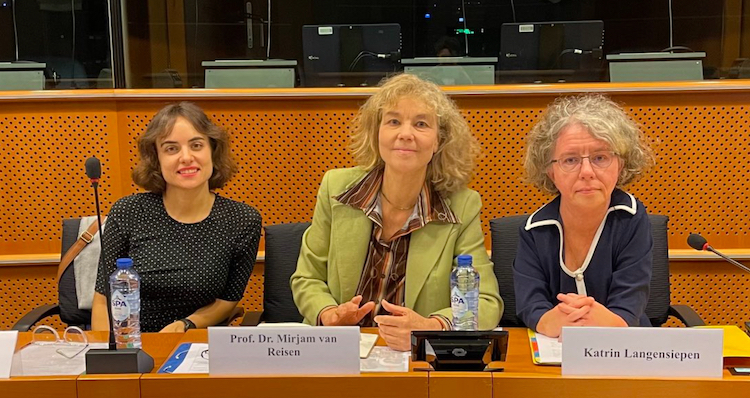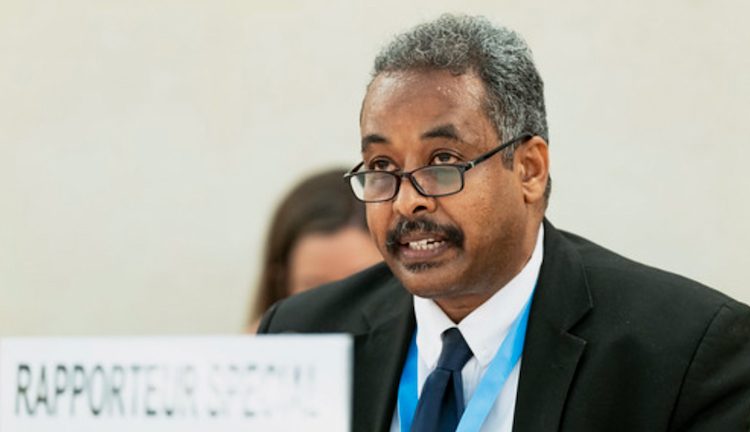BRUSSELS | 27 October 2023 (IDN) — UN Special Rapporteur on the situation of human rights in Eritrea, Dr. Mohamed Abdelsalam Babiker, has expressed “great concern” that almost a year after the signature of the Cessation of Hostilities Agreement (CoHA) between the Ethiopian government and the Tigray People’s Liberation Front (TPLF), “Eritrean families continue to live in anguish.”
He urged the EU Member States to exert “maximum pressure on Eritrea to implement the recommendations made by Special Rapporteurs and by the Commission of Enquiry on the situation of human rights in Eritrea, and to consider all available measures to ensure access to justice for the Eritrean People, including exercising universal jurisdiction.”
Following are extensive excerpts from the UN Special Rapporteur’s statement to the European Parliament Roundtable on Eritrea, hosted by Katrin Langensiepen (The Greens/EFA) Greens in Brussels on 25 October:

A glimpse of the European Parliament Roundtable on Eritrea.
Since I took up the mandate of UN Special Rapporteur in September 2020, the human rights situation in Eritrea has continued to deteriorate. The two-year-long conflict in Tigray erupted two months after I took on the duties of Special Rapporteur. Over the past three years, I have received testimonies and documented atrocities committed by the Eritrean Defence forces in Tigray, including massacres, extrajudicial killings, sexual violence, kidnappings, destruction of humanitarian infrastructure and targeting of Eritrean refugees, and looting.
I continue to receive information regarding human rights and humanitarian law violations committed by Eritrea in Tigray after the cessation of hostilities, including the kidnapping and enforced disappearance of civilians, extra judicial executions, sexual violence, and looting. The continued presence of the Eritrean Defence forces in disputed areas in Ethiopia, as well as the presence of a large contingent of Eritrean Defence Forces alongside the Eritrean–Ethiopian border is of great concern.
Beyond Tigray, I cannot emphasize enough the perverse impacts of the conflict on the human rights situation in Eritrea. The Eritrean government ramped up conscription campaigns, forcing thousands of Eritrean men, women, children, and older persons to fight in a war that has taken the lives of 400,000–600,000 people.
Thousands of Eritreans are estimated to have perished. In most cases, their families have not received any information about the fate of their loved ones. Almost a year after the signature of the Cessation of Hostilities Agreement between the Ethiopian government and the TPLF, Eritrean families continue to live in anguish and uncertainty as they wait to hear from them.
The Eritrean authorities effectively have raided the country, conducting round ups and conscripting thousands of Eritreans into the military. Those who attempted to evade the draft or refused to fight in Tigray faced harsh punishments to force them to comply: torture, arbitrary detention in inhuman or degrading conditions, extrajudicial killings for those who attempted to flee, and the collective punishment of their families and communities, who found themselves imprisoned, evicted from their homes, their homes destroyed, their cattle killed or starved.
When neighbours or relatives attempted to help them, they were threatened. I also documented the conscription and deployment of children—something that is not new in Eritrea, but that has escalated since 2020; and the kidnapping or pushback of Eritrean refugees from Tigray, who were later also forced to fight in Ethiopia.
Over the past year, the repression of freedom of religion or belief has escalated, with renewed waves of mass arrests of people of faith and attempts to control and interfere in all aspects of religious life, both in Eritrea and in the diaspora. As of September, an estimated 400 members of proscribed Christian churches remain arbitrarily imprisoned. Members of authorised religious communities are also under pressure. In October 2022, three Catholic priests were arbitrarily detained, and released in late December.
The followers and supporters of the late Patriarch of the Orthodox Church Abune Antonios are being persecuted, both in Eritrea and abroad, as the authorities seek to solidify their control over the Orthodox Church. 44 Orthodox monks were arbitrarily detained in April 2023. Between 150 and 180 teachers and students were arrested at an Orthodox theological college in Asmara.
In recent months, we have also seen an increasing polarization among Eritreans in the diaspora, with clashes between Eritreans in several European and North American cities. This is the result of the complete lack of civic space in Eritrea, and of any avenues for Eritreans to participate in decision-making in their own country. No elections have been held in over 30 years, and President Afwerki has continued to rule with no rule of law, no separation of powers, or any limitations to his power. Eritrea remains a single party state, where no political groups or movements are allowed to organise, and independent media and civil society are not allowed to operate.
As documented in my reports, journalists, political opponents, artists, people of faith, draft evaders, and returned asylum seekers, continue to be subjected to grave human rights violations including enforced disappearance, torture, and prolonged arbitrary detention in inhuman or degrading conditions. In that context, and with a large flow of Eritrean refugees and asylum seekers over the last decade, Eritreans in the diaspora have become increasingly active, organising, protesting, engaging in activism and mobilisation. These efforts have been met with pressure from the Eritrean diplomatic and consular services and from structures linked to the governing party.
Over the last three years in my mandate, I have gotten to know what Eritreans refer to as “the long arm of the regime.” This is the intelligence activities and interference of the Eritrean government with the lives of their citizens in the diaspora. I have received hundreds of testimonies that referred to the coercion Eritreans are subjected to, and the pressure to support the Eritrean government in different ways: social, with the participation in events, festivals and seminars; economic, through the payment of the 2% tax and contributing financially to a variety of causes and calls for funding; and physical by volunteering their time to participate in organisations, taking on responsibilities, and carrying out tasks. Those who refuse to participate are considered government opponents and face stigmatisation and ostracising in the community.
In some cases, they are expelled from their churches, others face intimidation. Those who do not pay the 2% tax or are flagged as opponents, cannot access any consular services, or even services from the administration in Eritrea. This can have a huge impact on their lives and the lives of their families: in some cases, the entire family cannot settle an inheritance or register land for this reason, in other instances relatives in Eritrea are threatened with losing their business licenses, and the persons concerned, or their family members, are denied the right to burial in their homeland in Eritrea.

Credit: Martin Plaut | Right to Left: Katrin Langensiepen, Member of the European Parliament (The Greens/EFA); Prof Dr. Mirjam van Reisen, Prof. International Relations, Innovation and Care, Tilburg University; Prof. FAIR Data Science, Leiden University; Expert on Eritrea (Chair); Kai Smits, PhD Fellow at Tilburg University.
I want to take this opportunity to highlight the plight of Eritrean refugees and asylum seekers, and the responsibility of the EU to provide legal routes to safety and effective protection. According to UNHCR, over 577,000 Eritreans had sought asylum as of end of 2022. Eritrean refugees and asylum seekers face perilous journeys and are often subjected to grave human rights violations along the way. Their situation has only deteriorated in recent years, as the two main destination countries for Eritrea—Ethiopia and Sudan—face conflict, instability, and violence.
There were over 130,000 Eritrean refugees and asylum seekers in Sudan at the onset of the conflict on the 15th of April this year. A large proportion of them have been displaced again, facing violence, heightened difficulties to move safely, and an increased activity of human trafficking networks in the region. I have received several reports about missing Eritrean refugees, raising alarms that they may have been kidnapped by traffickers or by the Eritrean authorities.
In Libya, Eritrean asylum seekers are particularly vulnerable, as they are perceived by traffickers as more lucrative for kidnapping for ransom. I have spoken to dozens of Eritreans who were kidnapped and tortured at their passage through Libya. Almost all the women described having been raped. This cycle of violence must stop. I take the opportunity in this forum to call on the EU to exercise solidarity, adequately protect Eritrean refugees and asylum seekers, and ensure their access to and enjoyment of human rights.
I also call on the EU Member States to exert maximum pressure on Eritrea to implement the recommendations made by Special Rapporteurs and by the Commission of Enquiry on the situation of human rights in Eritrea, and to consider all available measures to ensure access to justice for the Eritrean People, including exercising universal jurisdiction. [IDN-InDepthNews]
Photo: Dr. Mohamed Abdelsalam Babiker. Credit: MartinPlaut.com
IDN is the flagship agency of the Non-profit International Press Syndicate.


